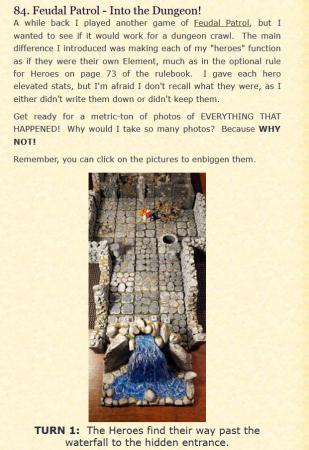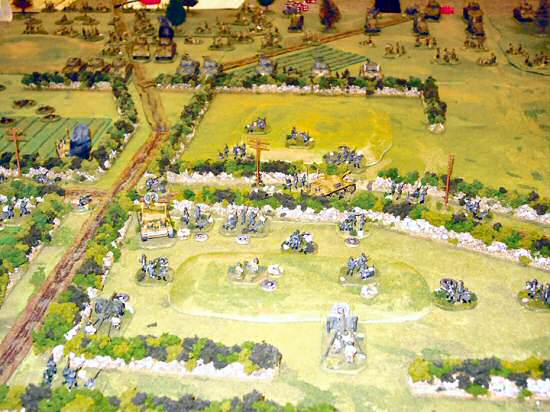This is the first figure I've completed for the new TMP project. I chose to kick things off with an archer. He's a pretty straightforward model, and will serve as a great jumping off point for the project.
The Fezmaster (that'd be ![]() Editor in Chief Bill
Editor in Chief Bill ![]()
![]() ) has foolishly given me free rein for the army color scheme. A clean slate!! I can let my imagination run wild! Well… not really, I want to try to paint the sample figures in a way that will be easily duplicated – I don't want to get too fancy, because I've got no real idea what the unit painters can deliver. (I have seen some very nice stuff from some of the services, though, so I'm not really worried.)
) has foolishly given me free rein for the army color scheme. A clean slate!! I can let my imagination run wild! Well… not really, I want to try to paint the sample figures in a way that will be easily duplicated – I don't want to get too fancy, because I've got no real idea what the unit painters can deliver. (I have seen some very nice stuff from some of the services, though, so I'm not really worried.)
With these thoughts in mind, I decide that the archer will be done in mostly brown, with some red to fight off the monotony. Brown is great for leather, cloth, wood, whatever – it's versatile; red will be the unifying color for the army. Every figure will have some red on it, to make sure it looks as though these little troops belong together.
The first thing to do is clean the figure up. The figure I chose had a typical mold line running most of the way around the height of the figure – 10 minutes or so with a file, and that blemish was history. A quick wash with dish soap and warm water, and he's ready to paint. Before applying the basecoat, I thinned some Future floor wax with water and slathered it onto the figure – this will serve as my primer.

As this guy is wearing leather, I decided to give him a brown basecoat. The Future dries fast (especially when you hold the mini up to a 100-watt bulb!), so in no time, I've got a decent basecoat on the figure. I didn't bother making sure the base was completely even, because I knew that my next step would do a lot to conceal imperfections in the basecoat.

After the basecoat had dried thoroughly, I mixed some brown and black ink and water. If I didn't let the base dry well before applying the ink, I'd make a real mess of things and likely have to go back and redo the basecoat. The ink goes on heavy – I use an old #3 brush and just slop it right on. After the slopping is over, I rinse and dry my brush, and then go back to the figure to wick off any ink that is pooling in places I don't like.

I allowed the wash to dry thoroughly - it takes some time, but it's important to be sure it's fully dry. The next step was to drybrush the entire figure with a medium brown color – the one I chose was about the color of milk chocolate. I actually drybrushed the figure a couple times to build up more color in a few places that I thought needed to be lighter.

With the brown highlighted, it was time to block in some of the other colors. I used a dark, purplish red for his tunic, and a light tan color for the straps around his wrists and ankles. At this point, I started being a bit more careful – I didn't want to have to go back and fix up the brown!

Immediately after finishing with the tan and red, I moved on to blocking in everything that would end up black or gray. While I had the black paint out, I also took a moment to add some stripes to the bow to simulate wood grain.

With my basic colors in place, I began to highlight the figure. I started with the black parts – I simply added gray to black for a nice dark gray. For the red, I took some time building up to a vibrant, bright red color – I kept the paint thin, and applied it in a number of layers to get a nice, smooth finish. The brown was highlighted with a mix of chocolate brown and tan. Again, I kept the highlights simple.

To finish up, I painted the flesh bits, metals and hair. The metals were quick and easy, the studs on his vest are straight silver – no shading or highlights, though I was careful to leave a bit of black showing for a nice outline. For gold, I've been starting with a dark bronze color lately - I add gold and then silver to this base color for my highlight stages.
The flesh was done in three stages – I began with a terracotta base color, and added a pale peach color to it for the initial highlights. I simply added a bit of white for the final highlight. To tie the flesh colors all together, I gave the skin bits a light wash of brown ink mixed with water.


All that remained was to base the figure. ![]() Editor in Chief Bill
Editor in Chief Bill ![]()
![]() had informed me that at least one overseas painter had no access to static grass, so I decided to keep the base very simple. I used a mix of Woodlands Scenics Green Grass flock and Yellow Grass flock. To apply the flock, I simply coated the top of the base with white glue and dipped the whole figure into the flock… a couple quick shakes to remove the excess, and my basing was complete.
had informed me that at least one overseas painter had no access to static grass, so I decided to keep the base very simple. I used a mix of Woodlands Scenics Green Grass flock and Yellow Grass flock. To apply the flock, I simply coated the top of the base with white glue and dipped the whole figure into the flock… a couple quick shakes to remove the excess, and my basing was complete.
The final step was to give the figure a couple coats of Krylon Matte Finish. This stuff is just as good as Dullcote and a lot less expensive – it's the only sealer I've been using lately.
There you have it, one finished archer!











